- Home
- Matt Goldman
Broken Ice--A Novel Page 3
Broken Ice--A Novel Read online
Page 3
I must have glanced at the vase of arrows too long because Lauren said, “He’s awake.” Then she, Ellegaard, and Micaela gathered around my bed. Micaela took my hand.
“Welcome back,” she said. I hadn’t seen her in a year. Her strawberry blond hair still frizzed well past her shoulders. Her pale skin looked like it hadn’t seen the sun since September. Her annual spring trip to Aruba or St. Barth must have been a week or two away. The lamplight was her doing. She knew I hate fluorescents and probably sent an underling lamp shopping on my behalf. “How you doin’?” she said with a half-smile. Her round, gray eyes shined.
“Well, you know,” I said, “I got shish kebabbed.” My mouth felt like dryer lint. Lauren poured me a glass of water. “What time is it?”
“It’s 7:30,” said Ellegaard. “At night.”
“Fuck. I lost most of a day.”
“Don’t worry about it, buddy.”
“How’s the pain?” said Lauren. She was an oncology nurse, but this was the first time I’d benefitted from her bedside manner. Long dark hair, olive skin, and emerald eyes. She’d lost weight since we met. Men turned their heads. It ignited nothing in me. I wish it did. I wish I loved her like that. But I didn’t.
“The pain hurts,” I said. “But that would be weird if it didn’t, right?”
“I suppose it would,” she said. She took my free hand. “You’ll have to wear a sling for a while. Your left arm won’t be much use.”
Not what a left-handed guy wants to hear.
The remainder of Stone Arch Investigations entered. Ellegaard introduced Leah Stanley and Annika Brydolf to Micaela.
Leah Stanley’s a twenty-three-year-old African American who grew up in North Minneapolis and graduated from Macalester College with a degree in cognitive science. I’m still not sure what the hell that is. Ellegaard and I knew her dad, a retired Minneapolis cop who helped train us when we were cadets. He sent his daughter to us out of respect or revenge. We hired her for one year so she could pad her résumé and bank account before going to law school.
Leah’s short with medium dark skin, curves, golden eyes, and a teased-out Afro. She wears big earrings and skirts and button-down oxford shirts under sweater vests in the winter and without sweater vests in the summer. Ellegaard takes a mentor tone with her, and I belittle her for wanting to waste her life as a lawyer. She responds to both of us with indifference because she thinks she’s smarter than us and she’s right.
Leah said, “You look worse than usual.”
“If I’d known you were coming, I would’ve made myself pretty.”
“You just keep believing anything’s possible.” She did not smile.
“I think you look great, Nils.” Annika Brydolf is a thirty-five-year-old single mother who always wanted to be a cop but circumstances intervened. She’s my height with long, black hair, white skin, and glacier blue eyes that won’t look at you very long. She’s thin and wears silky shirts and bell-bottom jeans that go all the way to the ground over wedged shoes, which is a bit white trash, walks her around at five eleven, and makes her attractive the way you think girls are attractive when you’re thirteen.
Her right eye droops at the outside corner from nerve damage courtesy of her ex-husband’s fist. She limped into our office days after we’d opened because the police didn’t have the manpower to enforce the restraining order on her ex-husband. We did a little digging and learned he was into a few things that could send him to jail. He just needed a little nudge, and we were happy to give it. Annika couldn’t afford to pay us, so we cut a deal with her to work undercover on another case.
Despite her adolescent sense of fashion, Annika Brydolf is a beautiful woman. When you first meet her, you notice her droopy eye, which makes her beauty less intimidating and gives stupid men the idea they have a chance with her. So we sent her into a bar to distract one particularly stupid man while we wired his home with surveillance equipment to prove he was stealing trade secrets from his employer. She handled herself and the stupid man well, is good with a camera, and available to work stakeouts during school hours. So we gave her another case and then another then made her our full-time investigator-in-training. Another five thousand hours on the job, and the State of Minnesota might grant her a license.
Annika said, “How’s the food in here? Want us to get you a pizza?” She touched my cheek like a mother checking her kid’s temperature.
Leah said, “Yeah. Whatever you need. We’ll get it. No need to get up and show us your ass hanging out the back of that gown.”
I said, “Whatever they’re dripping into me, tell them to increase the dose now that Leah’s here.”
Leah finally smiled.
Lauren said, “The drip contains antibiotics and OxyContin. So far you don’t have an infection. They’ll keep a close eye on you the next few days to make sure.”
“No, they won’t. I got to go.” I hadn’t intended to say it out loud, but I did.
“Not happening, buddy,” said Ellegaard.
“Nils,” said Annika, “you’re staying put.”
They all looked at me as if I were a dog on a chain. Sure, I didn’t like it, but at least I wouldn’t run into the street and get myself run over. “Do you mind giving me a moment alone with Ellie. My partner and I need to talk.”
Lauren said, “Talk as long as you want. You have days.”
Micaela leaned over and kissed me on the forehead. Lauren kissed me on the lips. Then Annika kissed me on the forehead. Leah slugged me on my right shoulder. The nurse entered. “Welcome back, Mr. Shapiro. I just want to—” Lauren stopped her with a look. The nurse turned around and exited with Lauren, Micaela, Annika, and Leah.
Ellegaard said, “The police will find who did this to you.”
“I’m their favorite. They’re probably going house to house right now, combing the city for someone who looks like Robin Hood.”
“Well if they don’t, we will.”
“Let’s go.”
“I’m not letting you out of here,” said Ellegaard.
“One teenage girl is dead. Another is missing.”
“The police will find her. Or they won’t. But you’re staying here.”
“The jacket said Graham.”
“What?”
“Haley Housh died wearing the letter jacket of a Warroad player.”
“So what? It was her boyfriend’s.”
“No, it wasn’t. Haley was dating a guy named Ben Haas from Woodbury.”
“Big deal, Shap. Guys let girls wear their letter jackets all the time. Especially on game day. Besides, the police know about it. They’re—”
“Don’t make me explain it, E. Don’t—” Fatigue pushed me hard into the bed. “I don’t have the energy to fight you on this. Just let me win.”
“The letter jacket did it to you?”
I nodded. Ellegaard had witnessed it enough times to know he couldn’t ignore it. It has nothing to do with psychic ability. I think of it more as the total sum of my thoughts and experiences being thrown into a massive equation that some part of my being comprehends but my mind can’t yet process. So I only get the feeling, not the knowledge. It’s like in baseball when the batter makes contact with the ball, the outfielder takes off running to the spot the ball will land. How, in that instant, does the outfielder know exactly where to go? I have no fucking idea. It’s not a conscious process. The math gets calculated someplace else.
Ellegaard stared at me for a while then said, “I suppose I could say we’re worried about a hospital-borne infection.”
“That’s good. I like that.”
“Only if Lauren moves in for a week or two to redress your shoulder and keep an eye on you.”
“I don’t think that’s a good idea.”
“Oh, Shap,” he said. “Really? I like her.”
“So do I.”
“Then why?”
Char Northagen entered without knocking. She wore jeans and a navy Patagonia shell over a lavender cable-knit
sweater. She carried an opalescent gift bag tied at the top with curled ribbons of green and gold. “Hey, guys. Hope I’m not interrupting you two declaring your love or anything.”
Even Ellegaard, the overgrown Boy Scout, the dedicated husband and father of three girls, stared a little too long at the statuesque queen of the morgue. “Uh, no,” he said. “Nothing like that.”
“I brought you a present, Nils.” She handed me the gift bag.
“About time,” I said. “Did you think I was going to let you off with just saving my life?”
“My intention wasn’t to save your life. That was a good arrow. I wanted it.”
I tried to untie the ribbon with my right hand. I failed. Char took the bag from me, untied the ribbon, opened the bag, and handed it back to me. I stuck my right hand in and removed a block of resin. An arrowhead floated inside the clear plastic. It looked like a surgical instrument made of two, crossed stainless steel razor blades that converged at a lethal point. A half-inch of threaded rod was opposite the point so the arrowhead could screw into a shaft. The signature of Ed Ashby was engraved onto the edge near the bevel.
Ellegaard said, “Holy Mother.”
“Who the hell is Ed Ashby?” I said.
“Ed Ashby designed the arrowhead,” said Char. “His signature is on all of them.”
“But this is the one that sliced through my shoulder.”
“The one that sliced through your shoulder is being held for evidence. This is just like that one. From my own personal stock. And be impressed. It’s called a GrizzlyStik. It’s 440c stainless steel with a straight edge, much better penetration than a convex edge. It’s razor sharp right out of the box. Whoever shot you wasn’t screwing around. These arrowheads run a hundred thirty-five bucks a pop.”
“What?” said Ellegaard.
“They’re designed for big game. Moose and polar bears. Even elephants. You’re lucky it hit you where it did, Shap. And that you don’t have much muscle to slice through.”
“What’s with the cheap shots, Northagen? What did I ever do to you?”
She smiled. “I find it ironic, to tell you the truth. The quality of the arrowhead may have been what spared you. Because you’re so slight, I only had to push a quarter inch for it to exit out your back. The thing’s designed for big game. What are you, five seven, a buck fifty?”
“I’m five nine. One sixty-five.”
“In heels and a parka maybe.”
“So, Char,” said Ellegaard, “was it your idea to send the bouquet?”
“I’m a county medical examiner, not a heart surgeon. I can’t afford to part with an arrowhead like this and send flowers.”
“I’m not talking about flowers,” said Ellegaard. “I’m talking about those.” He pointed to the arrows in the vase. The shafts stood, fletching end up.
“No,” said Char, “I didn’t send those. Who are they from?”
“I assume the police. I don’t know. They were delivered right before Shap woke up.” Ellegaard pulled the card from the bouquet. “The envelope says To Nils Shapiro from your favorite men in uniform.”
“Minneapolis or St. Paul?” I said.
Ellegaard opened the envelope and pulled out the card. He looked confused.
“What is it, E?”
He read, “Even good shots miss sometimes. The next one won’t. Compliments of the Warroad Warriors.”
Char Northagen pulled two purple latex gloves from a wall-mounted box and snapped them on with the ho-hum perfection of a medical examiner. She lifted the arrows from the vase then turned them over to get a look at the arrowheads. They were all tipped with GrizzlyStiks, just like the one she pushed out my back.
“Man,” said Ellegaard.
“An even dozen?” I said.
Char counted. “Eleven. One’s missing.”
“Gee, I wonder where it is.”
“This is an expensive message,” said Char. “Almost fifteen hundred dollars if my math is right.”
Her math was right.
5
Around 9:00 P.M. an orderly wheeled me out of the hospital. Ellegaard helped me to my feet, and I stood near the curb. My shoulder had stitches in front where the arrow entered, stitches in back where it exited, and whatever was in between had either been cauterized or sewn together with what felt like razor wire. Pain shot through the upper left side of my torso every time I blinked. The Oxy had worn off. I refused more—I needed to keep my head clear.
I scanned the parking lot like a deer stepping into a meadow. Whoever stuck me could try again. Ellegaard became my Secret Service agent, pacing in front of me, his eyes like mine, panning the perimeter. Apparently, someone didn’t want us investigating Haley Housh’s death or looking for Linnea Engstrom. Or both. SPPD had called Ellegaard to ask if either of us had seen anything prior to the arrow. We hadn’t. Ellegaard said the only thing he’d seen was a hostile attitude from the St. Paul Police.
Lauren pulled my new Volvo in front, got out of the car, and opened the passenger door. “This isn’t right, Nils. You should stay in the hospital for at least five days.”
Micaela approached with a St. Joseph’s Hospital tote filled with white wound dressing, antibiotics, and pain medication, as if I were on my way to run with the bulls. “Lauren’s right, Nils. This is ridiculous.”
“I know,” I said. “Ellegaard should drive.”
Lauren said, “Forget it, Nils. You’re not working tonight.”
“We just have one quick stop a few blocks from here. Then I’ll go straight home to bed.”
My ex-wife and current girlfriend couldn’t win if they played by my rules, so they invented their own. Micaela turned to Lauren and said, “Are you okay staying with him for a few nights?”
“Of course,” said Lauren.
“I’m happy to drop in on him once or twice during the day,” said Micaela.
“That would be great. I usually work from 6:00 A.M. to 3:00 P.M.”
“Perfect,” said Micaela. “Let’s exchange numbers.”
Micaela and Lauren exchanged numbers. Ellegaard saw my misery and did his best not to laugh, but his best wasn’t good enough. For most people who get shot by an arrow, the worst part is getting shot by an arrow. But for me, the worst part was watching Micaela and Lauren team up to oversee my recovery.
I let them finish and told Lauren I’d be home before 11:00. Ellegaard said it’d be closer to 10:00. He was wrong, but I didn’t correct him.
The Warroad Hockey Team was staying at the Wabasha Riverfront Hotel. It sits near the corner of Kellogg and Wabasha, two blocks from the Saint Paul Hotel where, earlier that day, Roger and Anne Engstrom hired me to find their missing daughter. The building faces the Mississippi River and the north end of the Wabasha Street Bridge. The south end of Wabasha Street Bridge is a minute’s walk to dead Haley Housh’s cave.
High school hockey fans crowded the lobby on their way to and from restaurants and bars. I scanned the faces for Linnea Engstrom. Maybe she wasn’t really missing but just switched allegiances and was running with another team, disguised as a Minnetonka Skipper or Duluth East Greyhound. No luck.
Ellegaard and I approached the front desk. A young woman with a lifetime membership to an all-you-can-tan salon stood behind the desk mustering as much authority as her hospitality services degree would permit. She wore an ill-fitting black blazer and white shirt. A name tag pinned onto her lapel through presewn holes read: JILL—GUEST RELATIONS SPECIALIST. Jill greeted us with a smile I knew wouldn’t last long. I had told Ellegaard to follow my lead. Carrying a badge gives a detective authority and access. Ellegaard was still learning how to replace his badge, although he’d done a damn good job with Officer Flynn outside the cave.
“Good evening,” said Jill. “Checking in?”
“No,” I said. She glanced at the sling holding my left arm to my chest. I had ditched my jacket in the car in the hopes of getting just that look. You use what you can. “We’re here to see Gary Kozjek.”
&n
bsp; “Is he expecting you?”
“No. We were hoping you could tell us what room he’s in.”
“I’m sorry,” she said, maintaining her smile. “I’m not at liberty to give out guest room information.”
“Huh. Well…” I paused. My entire left side felt like it might fall off. “Can you please call up to the room and tell Coach Kozjek that Nils Shapiro and Anders Ellegaard are here to talk to him about Linnea Engstrom?”
Her smile vanished. She recognized the name Linnea Engstrom. The missing teen was all over the news and social media. “Are you police officers?”
A thick woman who also wore an ill-fitting Wabasha Riverfront Hotel blazer appeared behind the desk. Her name tag said: PATTY—MANAGER. She must have been eavesdropping from wherever hotel desk clerks lurk before they appear.
“Hello. I’m the manager. How can I help you?”
Jill said, “They’d like to see Coach Kozjek from Warroad.” She whispered, “It’s about the missing Engstrom girl.”
The manager of the three-star hotel didn’t have much practice exercising discretion. Its most important guests were high school hockey coaches like Gary Kozjek and lobbyists from the Red River Valley Sugarbeet Growers Association or the Minnesota Turkey Growers who were in town for business at the capitol.
“Can you call him?” said the manager. “Do you have his cell phone number?”
“No, we don’t. Could you please call up to the room for us?”
“I’m sorry,” said the manager. “Normally I would, but Mr. Kozjek has left strict instructions not to be disturbed.”
I touched my sling with my right hand and said, “I know you’re in a sensitive position, but I can approach anyone in this lobby wearing a Warroad jacket and tell them we need to discuss Linnea Engstrom’s disappearance with Gary Kozjek. Warroad’s a small town. Everyone knows him. They’ll get him the message. That’ll save you the trouble of telling Gary we’d like to see him, but then you’ll be responsible for everyone in Warroad knowing his business.”

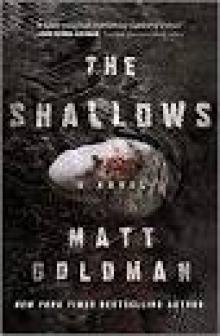 The Shallows--A Nils Shapiro Novel
The Shallows--A Nils Shapiro Novel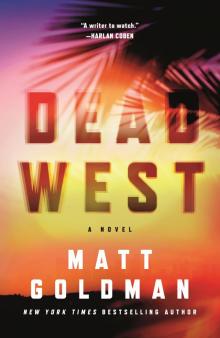 Dead West
Dead West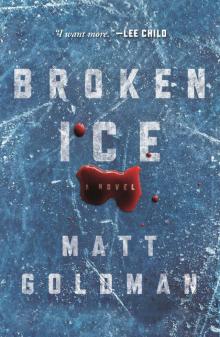 Broken Ice
Broken Ice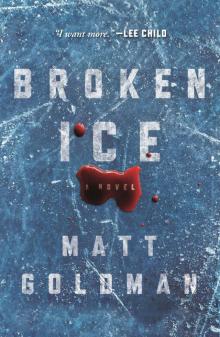 Broken Ice--A Novel
Broken Ice--A Novel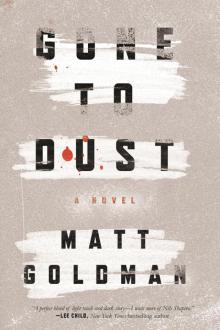 Gone to Dust
Gone to Dust